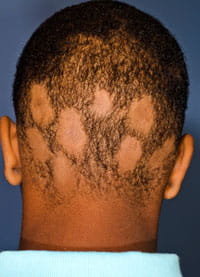What is Alopecia Areata?

Over 6 million people in the United States have alopecia. It affects both males and females, people of all ethnic backgrounds and can occur at any age. It is only rarely seen with other autoimmune diseases in children. Alopecia areata often happens once and then there is regrowth of normal hair. Sometimes, hair loss followed by periods of re-growth may happen again and again. This may happen over many years.
- Alopecia areata is the name for patches of hair loss, usually in the scalp
- Alopecia totalis is the name for complete loss of scalp hair
- Alopecia universalis is the name for complete loss of hair on the head, face and body. This may occur very rapidly.
Treatment
For limited areas of alopecia, the affected hairs shed and new hair may regrow. No treatment is usually needed as 95% of the time the hair will regrow.
Your doctor may prescribe a few medications to try to help the hair to grow. However, there is no good evidence that any of these treatments will guarantee the hair will regrow.
These may include:
- steroid cream, ointment or solution that is put on the skin where hair loss has occurred
- another type of medicine put on the skin, called topical calcineurin inhibitors (like Elidel cream, or Protopic ointment)
- a form of vitamin A that is put on the skin (topical retinoid)
- steroid injections
- vasodilator pills, solution or foam (minoxidil)
- Janus kinase inhibitors
- immunosuppressant agents
- topical prostaglandins
Follow the instructions for use very carefully. If the skin gets irritated, or if you have any questions, please call your doctor.
There is little evidence that use of oral medicines will produce lasting hair regrowth, and the side effects of these medicines usually outweigh any potential benefit.
Will my Child’s Hair Regrow?
Hair may or may not regrow. Hair that is trying to regrow may respond to treatment and continue to regrow. There is little evidence that hair that is not trying or able to regrow can be “made” to regrow by the use of medicines or other treatment.
What Factors Will Affect Hair Regrowth?
- Age of the child: The younger your child is when hair loss starts, the less likely it is to grow back.
- Amount of hair involved: If your child has many areas of hair loss, it is not likely to grow back.
- Amount of time: The longer the hair loss continues, the less likely it is to grow back.
If you are interested in wigs or hairpieces, you may wish to contact Locks of Love. They provide affordable, sometimes free, hairpieces for children with alopecia.
Visit the National Alopecia Areata Foundation for support groups and general information.



